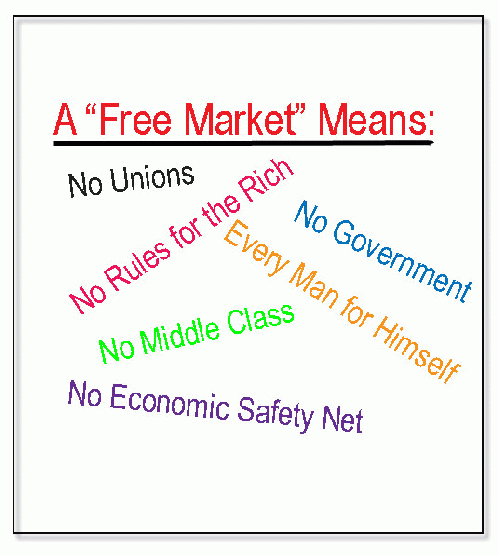We have long needed a ready response to the Republican yammering about "free markets." Free market myths of a utopian society run solely by each individual's unfettered (by government) greedy efforts to look after themselves come largely from the writings of Milton Friedman, a Nobel laureate University of Chicago economist. There should be a name for economies that have felt the real "benefits" of his free-market ideals, like the death of the middle class, the end of effective government, and the enriching of the powerful at the expense of everybody else. Perhaps an appropriate moniker for markets that have suffered the implementation of Milton Friedman's utopian free market could be called "Freed Markets." The definition of a "Freed Market" being one that
- * has been liberated from any rules and regulations, except those benefiting the people who already have money
- * has no value for economic justice (if you were born rich, you deserve it)
- * has zero interest in human rights
- * sees a society ruled by laws as an obstacle
- * has almost no middle class
- * cannot exist in a democracy
Over the last half of the 20th century Friedman's ideology has run roughshod over much of the third world. As Naomi Klein described in her book, Shock Doctrine, it has been Friedman's notions of the benefits of pure free markets and his recognition and promotion of the tactical benefits of imposing his ideas quickly that has guided tyrants, dictators, and corporatists to select his vision of economic utopia. The reason for choosing his approach may well have been anything but idealistic or even academic because for those in power the benefits of an economy where there are only the very, very rich and the very poor are obvious.
During his life Friedman and his followers unabashedly advised the Chinese communist party leaders, Chile's Pinochet, Argentina's juntas, South Africa's apartheid National Party, and Iraq's occupation leaders to grab moments when a nation is shocked by some calamitous event to ram through their economic and social agenda without allowing any opposition. Perhaps Friedman said at some time during his life that it was really too bad that some leaders would take things a bit too far by imprisoning tens of thousands of people in the opposition, by torturing thousands of people likely to be leaders against his "reforms", and by "disappearing" thousands more. Perhaps he said those things, but never to his clients as they carried these crimes out.
Friedman's economies have enriched corporations and the richest tiers of society by encouraging the dumping of the assets in the public sphere into private hands at fire sale prices, by eliminating rights for workers, by allowing corporations to be the final word on regulations of their industries, by removal of any protection for jobs from foreign competition, and by destroying the economic safety net for the remainder of society. In short, Friedman advocated getting rid of most of the pillars of a healthy middle class and returning to a feudal society so that the rich can run things as they want. And, wherever Friedman's utopian ideals have been implemented (usually via murder, torture, and terror), it has been successful--at least temporarily--in doing just that.
One might assume that in each situation the adoption of Friedman's economic "utopia" happened because whatever the country already had wasn't working. That assumption would be incorrect. For example, Chile's economy had low unemployment, low inflation, a strong middle class, and a strong economic safety net in place until attacked overnight by Pinochet aided by University-of-Chicago-trained Friedman disciples. In fact, an overnight attack is an integral part of Friedman's economic ideology strategy. His "free" market economic regime must be imposed quickly so that no organized resistance has time to form to oppose it. So, if there wasn't some external shock that introduced this opportunity for change, then Friedman's implementers (like Pinochet's economists in Chile) saw no reason they couldn't create their own shocks to make swallowing their ideas "easier" for an economy.
If this story of third world trials and tribulations sounds familiar, it should. We are in the middle of a similar struggle here. For example, the owners of the Republican Party have adopted the strategy of introducing shocks to the nation (e.g. recent debt limit "emergency") as a way of introducing fear into the electorate so that their social and economic agendas can be implemented, or at least to stand in the way of anybody else's ideas. Friedman's notions of how to further enrich the already rich and how to empower corporations were so successful that those same people in our society who have for thirty years been benefiting from converting healthy third world economies into post-middle class feudal societies have now brought their act here.
However, as the Occupy Wall Street movement has shown, perhaps we now have enough shared experience to understand exactly what freed markets are. Perhaps now whenever a politician spouts notions of the country needing "free market reforms", we can answer, "Fine, but we don't want to be a Freed Market." Perhaps now that we realize that introducing shocks into the nation is nothing more than a political strategy, we can better understand what (and who) was driving the events of 9/11. Perhaps the people who were quickly prepared after 9/11 to use 9/11 to take away basic freedoms (e.g. access to habeas corpus and protections from warrantless eavesdropping), who were already preparing to attack Iraq on 9/11, and who were unable to respond effectively to defend the nation that day and the terrorists who attacked us on 9/11 are the same people. Help find out by signing the petition calling for a real investigation of 9/11 at the whitehouse.gov website (http://wh.gov/n1B).






